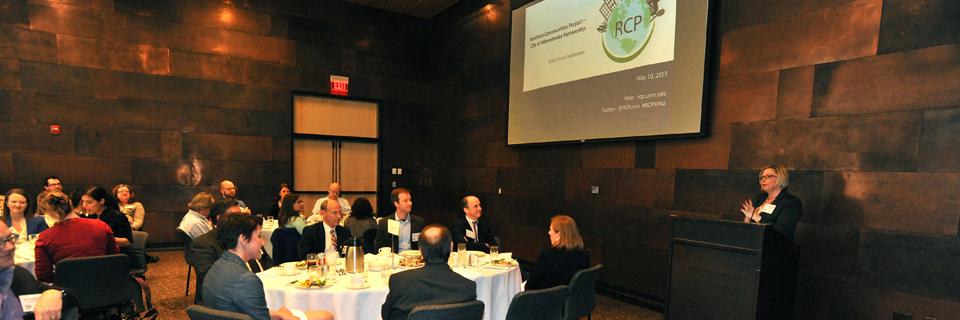By Carissa Schively Slotterback
As we move into our second year of the Resilient Communities Project (RCP), it is exciting to think about all that we have been able to accomplish since we started RCP a little more than one year ago. While a bit outside of our modest Minnesotan comfort zone, we want to share a few of our successes.
First, and absolutely critical to our ability to get off the ground so quickly, was our partnership with the City of Minnetonka. Based on big aspirations and strong social capital among all, Minnetonka jumped into a partnership with RCP, developing a list of local priorities and pulling together a strong and diverse base of city staff. In our first year, we worked on 14 local projects in 25 U of M courses in eight colleges. Across these courses, we engaged hundreds of students in addressing critical sustainability issues. Projects ranged from alternative stormwater designs for Ridgedale Mall to an exploration of neighborhood identities. Students’ analyses revealed opportunities to save City resources through increased street sweeping to protect water quality. Their work also pointed to strategies to increase the City’s competitiveness in the mid-priced housing market and foster aging in place, positioning Minnetonka to proactively respond to changing demographics. Students explored transportation demand and redevelopment impacts associated with the planned Southwest Light Rail line, and also highlighted innovative practices related to green roofs, water and energy conservation, parking, and conservation development.
Second, we helped to advance the conversation about sustainability education at the University of Minnesota. As an initiative of the Sustainability Faculty Network, RCP serves as a highly visible example of how sustainability can be integrated across the curriculum. Further, RCP’s success, even as an untested model, to achieve broad engagement of courses, colleges, faculty, and students is a testament to the very high level of interest in sustainability across campus. In addition to advancing a new model of sustainability education, we also believe that RCP offers an innovation, or at least an evolution, in the way that we do public engagement in universities. RCP relies on a deeply collaborative model that facilitates sustained engagement in the partner community. By working intensely with the community for an entire year, we are able to develop relationships among all involved. We are able to build long-term capacity for work on sustainability and long-term connections that will benefit local staff, as well as faculty and students at the university, for years to come. Our approach to engagement also differs in that we see our role as going beyond unbiased matchmaker. We are not wholly objective, as we are driven to advance the very best and most current sustainability solutions, engaging faculty innovators, drawing on knowledge from multiple disciplines, and facilitating projects that advance the practice of sustainability.
We are excited to kick off our partnership with the City of North St. Paul this week. Stay tuned over the next few weeks as we introduce our new partner community and the many sustainability projects that we’ll be working on this academic year.
Carissa Schively Slotterback, Ph.D., is director of the Resilient Communities Project and associate professor and director of the Urban and Regional Planning Program at the Humphrey School of Public Affairs, University of Minnesota
